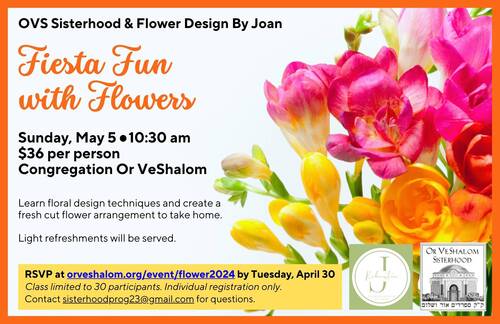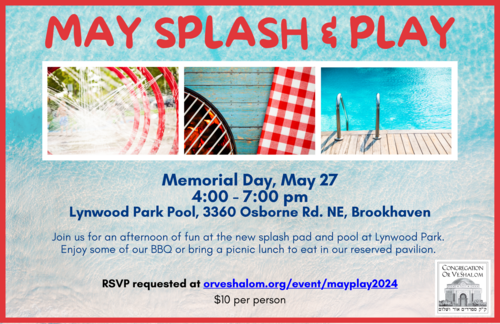February 15, 2024
02/15/2024 12:41:02 PM
Rabbi Hearshen
| Author | |
| Date Added | |
| Automatically create summary | |
| Summary |
I’m struggling to write this article. I know this isn’t the greatest introduction you’ve ever read, but please stay with me here. Since October 7th I’ve written every article about the war in Israel. I’ve purposely spoken about Israel on every Friday night and every Saturday morning. I’ve done this because rabbis must be relevant when they write and speak. I cannot think of anything that’s more relevant to our lives right now than what’s happening to the Jewish world. But I’m tired. I’m tired of the pain and sorrow. I’m tired of being stuck. I’m tired of defending. I’m tired of forcing some supportive statements into the themes of the Torah portion. I’m tired. But I’m also quite scared. I’m scared if I don’t write about Israel for one article we’ll begin to accept it as the new normal. I’m scared we’re losing our drive and our determination. I’m scared we’ve reached the stage of grief of acceptance and that acceptance spells doom for us because it makes us complacent. So, I’m torn between the need to speak about the depth of the Jewish experience and the richness of a life committed to Judaism versus the need to continue to keep us at a heightened sense of alertness in our defense and support of the State of Israel. With all of that in mind, I’m dedicating this article to the people of the State of Israel. To the members of the IDF and to the hostages in Gaza. I’m dedicating this article to those who are in hospitals fighting to get better. May our learning together, coupled with our prayers, lift them up and help them find the strength to keep fighting the good fight.
Why do we build synagogues? Why do buildings matter? Or VeShalom is not a building, although we own one and we use it to gather. It’s a community. People do not “belong” to the בית כנסת/Beit Knesset (Hebrew word for the synagogue building) they “belong” to the קהילה/Keilah (Hebrew word for community). When we left our first building for Virginia Highland, it didn’t mean we ended or started anew. It meant we took our community from one gathering place to another. When we moved into our current home in the 70s, we didn’t create a new organization. We continued what had already been established.
We build synagogues because we need to have a place to gather. We decorate those places so they’re conducive to the varieties of gatherings we have. But it’s not about the building. It’s about the people in the building. One of my favorite quotes from the Torah is “ועשו לי מקדש ושכנתי בתוכם/And they shall make Me a holy place and I will dwell in them”. Chances are I wrote about this last year and the year before that. I simply love this quote and the depth that can be found within it. The issue is one of Hebrew grammar. The object being built is written in the singular, but the place where God is asserting that God will dwell is in the plural. The dwelling is in “them” and not “it”. What the text is trying to assert is that through sacred building and sacred acts we bring God into the world.
When I came to OVS in 2020, the world was in chaos. COVID 19 was all we talked about and we were doing everything we could to stay safe and healthy. We were remote, not because of convenience, but because of fear both real and perceived. Over the few years since then, we’ve had some false starts and some real ones, and thankfully came out of the darkness into some light we’re now blessed to appreciate. The problem is we’re not fully back to normal. The problem is our isolation and “solutions” have become a new normal. Being remote was something we did because of illness but it can’t be what it takes to make us healthier and stronger.
Judaism is a religion of gathering and togetherness. It’s a religion God called on us to build together so God could be in us. Judaism isn’t so much about the individual relationship with God as it’s about the communal. It’s time for us to return to our building (I mean that as a noun and a verb). We need to come back to the building and be together. We need to be together. And we also need to return to our acts of building (the verb) and grow as Jews and as spiritual people. We need to learn and reassert our commitment to our Judaism. That’s what it means when we build a Holy Place for God. We need to be building so God can be in us. I love the State of Israel. I support the State of Israel unapologetically. I’ll never change this for a moment. At the same time, we cannot continue to replace our Judaism, Jewish observances, and beliefs, with Zionism. We must take care of our spiritual selves and allow for our deep commitments to Zionism to be a component of our Judaism but not the entirety of it.
Wed, May 1 2024
23 Nisan 5784
Worship Services
Coming Soon at OVS
-
Sunday ,
MayMay 5 , 2024Sisterhood Fiesta Fun with Flowers
Sunday, May 5th 10:30a to 12:00p
Learn floral design techniques and create a fresh cut flower arrangement to take home. Limited to 30 people. Individual registration only. -
Sunday ,
MayMay 5 , 2024FunRaising Dinner - Bob and Dale Israel
Sunday, May 5th 6:00p to 8:00p
Join us for dinner hosted by OVS members Bob and Dale Israel. All proceeds benefit OVS. -
Monday ,
MayMay 27 , 2024May Splash and Play
Monday, May 27th 4:00p to 7:00p
Join us on Memorial Day for an afternoon of fun at the new splash pad and pool at Lynwood Park in Brookhaven. We've reserved the upper pavilion near the playground. Enjoy BBQ on us or bring a picnic lunch. -
Sunday ,
JulJuly 21 , 2024FunRaising Dinner - Rabbi and Carrie Hearshen
Sunday, Jul 21st 6:00p to 8:00p
Join us for dinner hosted by Rabbi and Carrie Hearshen. Rabbi Hearshen will prepare his famous BBQ! All proceeds benefit OVS. -
Sunday ,
AugAugust 11 , 2024FunRaising Dinner - Clare and Robert Habif
Sunday, Aug 11th 6:30p to 8:30p
Join us for a Cuban dinner hosted by Clare and Robert Habif. All proceeds benefit OVS.
Burekas & Biscochos
The Sephardic Cooks
My Preferences for Contact
Tonight's Sefirah Count Is 9
| היום תשעה ימים שהם שבוע אחד ושני ימים לעמר |
Today's Calendar
| Hebrew for Dummies (scroll down to register) : 7:00pm |
| Prayerbook 101 (scroll down to register) : 8:00pm |
This week's Torah portion is Parshat Achrei Mot
Candle Lighting
| Friday, May 3, 8:05pm |
Havdalah
| Motzei Shabbat, May 4, 8:59pm |
Shabbat Mevarchim
| Shabbat, May 4 |
OVS Feature Video



